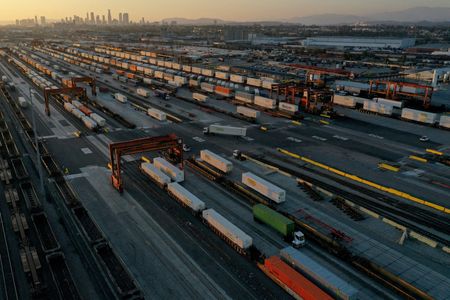LOS ANGELES (Reuters) -The leader of the largest U.S. business lobbying group on Tuesday called on Congress to intervene in an ongoing railroad labor standoff that threatens to idle shipments of food and fuel while inflicting billions of dollars of damage to an already struggling national economy.
U.S. Chamber of Commerce Chief Executive Suzanne Clark implored federal lawmakers to step in one day after members of the country’s biggest railroad union rejected a tentative agreement brokered by a board appointed by President Joe Biden.
“Congress must now impose the deal President Biden negotiated, and the railroads and union leadership agreed to,” Clark said.
Biden’s Presidential Emergency Board in August released the framework for the tentative deal forged the following month between major carriers like Union Pacific Corp and a dozen unions representing 115,000 workers.
Four unions have since rebuffed that deal, angered that railroads responded to their ask for 15 paid sick days with an offer of one paid personal day after their members kept vital goods flowing during the pandemic.
Those unions and their employers have until 12:01 a.m. on Dec. 9 to settle their differences. If they do not, workers could strike and railroads could lock out employees – unless Congress intervenes.
“If Congress fails to do so, a rail strike would substantially exacerbate inflation and the economic challenges Americans are facing today,” Clark said.
Executives from groups representing the coal, agriculture, retail and consumer packaged goods industries that depend on rail to transport 30% or more of their products also are urging Biden and Congress to take action.
A rail shipment stoppage “could create a debilitating logistics chokepoint for the movement of energy and materials resources essential to our grid reliability and energy affordability, as well as our manufacturing sector and the energy security of our allies in Europe,” said Rich Nolan, CEO of the National Mining Association.
“We urge you to take action now rather than wait until the last minute to intervene,” said Tom Madrecki, vice president of supply chain and logistic for the Consumer Brands Association, which represents makers of everything from peanut butter to household cleaning products.
(Reporting by Lisa Baertlein in Los Angeles; additional reporting by David Shepardson in Washington and Ernest Scheyder in Houston; Editing by Chizu Nomiyama, Marguerita Choy and Jonathan Oatis)

